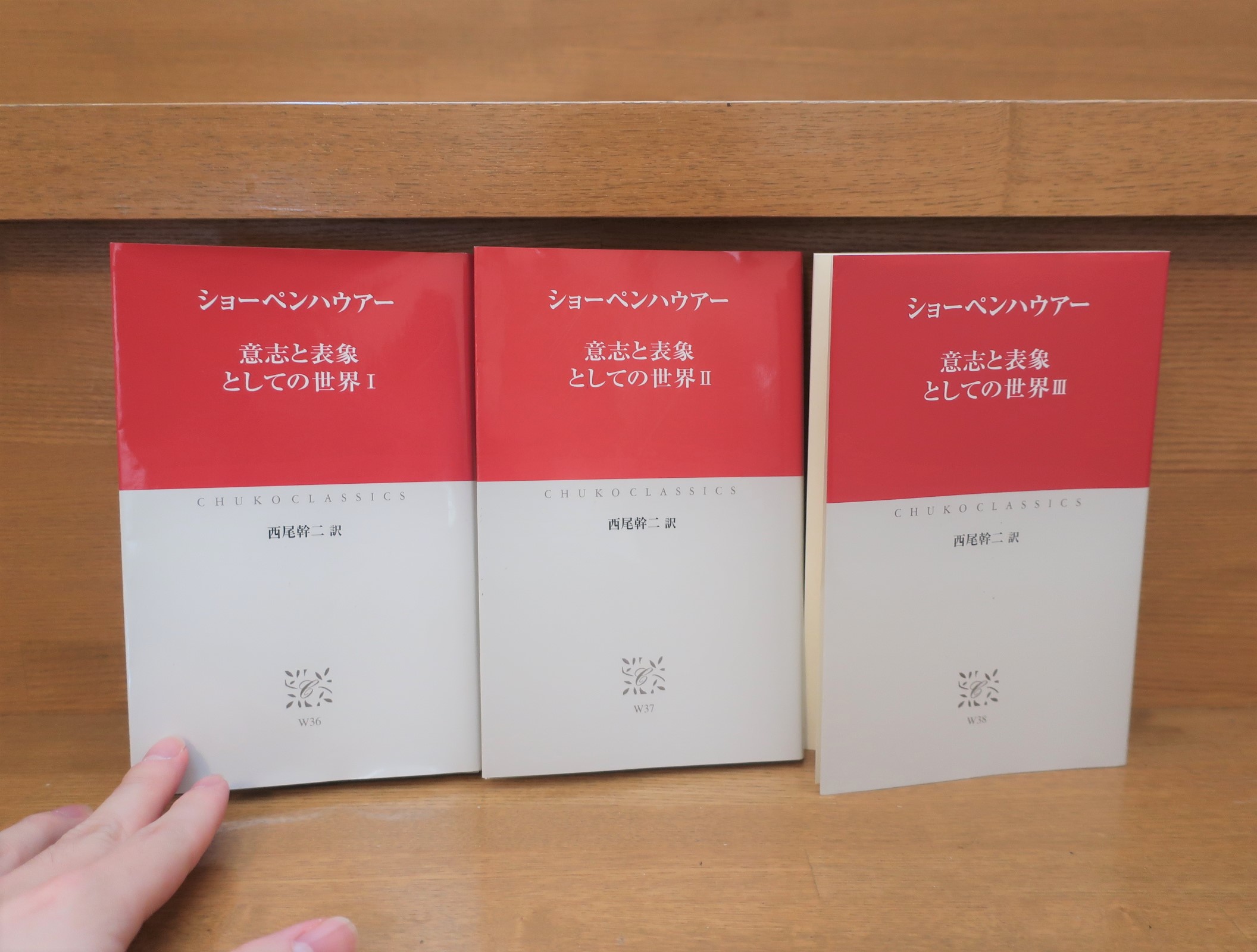ショーペンハウアー『意志と表象としての世界』あらすじと感想~やはり難解!ドイツの大哲学者の主著

ショーペンハウアー『意志と表象としての世界』

『意志と表象としての世界』は1818年にドイツの哲学者ショーペンハウアーによって完成された作品です。
私が読んだのは中央公論新社、西尾幹二訳の『意志と表象としての世界』です。
早速この本について見ていきましょう。
世界とは「わたしの表象」、人生とは。苦悩、そして解脱とは。
ショーペンハウアーの魅力は、ドイツ神秘主義と18世紀啓蒙思想という相反する二要素を一身に合流させていたその矛盾と二重性にある。いまその哲学を再評価する時節を迎えつつある。
Amazon商品紹介ページより
この本は有名なこの言葉によって始まります。
「世界はわたしの表象である」
中央公論新社、西尾幹二訳『意志と表象としての世界Ⅰ』P5
このことについてロシア文学者の佐藤清郎氏は次のように述べています。
時代のぺシミズムに哲学的根拠を与えたのはショーぺンハウアーですが、その主著『意志と表象の世界』は、「自然というものは、結局のところ究められないのではなかろうか」を副題として、「世界はわたしの表象である」で始まり、「現象とは表象のことであり、それ以上の何ものでもない。いかなる種類のものであれ、すべての客観は現象である。しかるに意志だけが物自体である」と言い、意志は無限の欲望を産み、欲望は苦とつながり、「生ずるものはすべて滅びるのがその報いだから、何ものも生じないほうがよい」と論じたものです。
以文社、佐藤清郎『わが心のチェーホフ』P36
佐藤清郎氏はチェーホフやツルゲーネフについて数多くの著作を残した研究者です。チェーホフやツルゲーネフ、そしてトルストイもショーペンハウアーの強い影響を受けています。そのためこの『わが心のチェーホフ』という著作でもショーペンハウアーについて言及されていました。

さて、この解説をさらにざっくり言うと、「世界は私の主観(意志)によって現れたもの(表象)であり、私が消えれば世界(表象)も消える。」ということになります。
そして「私が生きようとすれば欲望が生まれ、その欲望は苦しみを生む。私がなければ世界は存在しない以上、私が消えれば世界は無意味になる。そもそも無意味な世界になぜ苦しむために生きねばらならないのか」ということをショーペンハウアーは提起するのです。
佐藤氏はこうした悲観的な考え方について続けてこう述べます。
ぺシミズム問答は、「まず何のために生きるのか」という学生の自問に始まり、「どう生きたって、結局死が待っているだけだ」という虚無主義に陥り、その口からはしばしば「どっちだって同じさ」という言葉がもれます。
以文社、佐藤清郎『わが心のチェーホフ』P37
こうして「どうせ死んだら無になるんだし、どう生きたって変わらんさ」という虚無主義が世の中に跋扈することになったのです。ショーペンハウアー自身はそこまで虚無を引きずっていたわけではないことは著作を読んでも伝わってきます。
しかし、彼の言葉は難解過ぎますし、『意志と表象としての世界』はかなりの大作です。これを完全に理解するのは当時の人たちにとっても現代の私達にとっても至難の業です。
そのためこれまで多くの誤解をされることになったと訳者の西尾幹二氏も解説で、
厭世主義、非合理主義、自殺の哲学、女性の敵、反動主義、性愛の哲学、頽廃の哲学―ショーぺンハウアー哲学にはさまざまなレッテルが貼られ、それらが一人歩きすることによって、無数の顔をもった妖怪のような姿で読者を幻惑する。そうした一般評価がほんとうに的を射たものであるかどうかは、読者諸賢が本書を直接読むことによって確認してくださるであろう。
ショーぺンハウアーの哲学は、十九世紀半ば頃、一八四八年革命から世紀末に至る近代市民社会の確立期に再発見され、脚光を浴びた。人々の先入観によって誤解され、脚色され、受け売りされて、哲学論争における仇役、切られ役としての派手なレッテルを貼られ続けた。しかも、まさにその先入観と誤解のレッテルのおかげで有名になるという皮肉な運命をもたどったのである。
中央公論新社、西尾幹二訳『意志と表象としての世界Ⅰ』P1
と述べています。やはりショーペンハウアーは誤解されやすく、そもそも難しいということを改めて感じました。
そして驚くべきことに著者のショーペンハウアー自身が序文でとてつもないことを述べるのです。
できるだけこの本を理解してもらうためには、どんな風に読んでいただくのがよいか、わたしはここでそのことを述べておこうと思い立った。この本によってわたしが伝えようとしているのはたった一つの思想である。だが、そのたった一つの思想を伝えるのに、わたしにはこの本全体よりも短い道は、どんなに苦心しても見つからなかった。(中略)
本書の中で提示した思想を深く会得するためには、この本を二回読むよりほかに手だてがないことは、おのずと明らかである。しかも一回目は大いに忍耐を要するが―本書では終りが始めを前提とするのとほぼ同じくらいに始めも終りを前提としている―このことを読者の方が自発的に信じてかかって下さらなければ、こうした忍耐は得られないのではないかとわたしは思う。
中央公論新社、西尾幹二訳『意志と表象としての世界Ⅲ』P247-249
ショーペンハウアーはまず言うのです。この本は2回読まねばわからぬと。
こんな難しくてしかも長い本を2回も読めと。しかも1回目はまずわからないだろうから忍耐が必要だと最初から宣言するのです。さすがショーペンハウアー、言うことが違います。
そしてさらに彼は要求を増やしていきます。
第二の要求は、本書を読む前にその序論を読んでもらいたいということである。もっともそれは本書には入っていないで、五年前に、『根拠の原理の四つの根について―哲学的な一論文』というタイトルで出版された本のことである。
この序説をなし予備をなす論文を熟知していなければ、本書のほんとうの理解はとうてい覚束ない。予備論文の内容はこの本の中ではいたるところで前提とされていて、まるでこの本の中に一緒に含まれているかのようである。
中央公論新社、西尾幹二訳『意志と表象としての世界Ⅲ』P251-252
「さすがにこれは厳しくないですか先生!」と思わず二度見してしまいました。ショーペンハウアーはもう一冊の本を熟知してからじゃないとこの本はわからないと言うのです。その本は和訳されてはいますが全集に収録されている作品で、単行本にはありません。しかもこれまたかなり難しそうな著作です。いよいよ厳しくなってきました・・・
ですがそんな私に構うことなくショーペンハウアーはさらに続けます。
最後に、読者に対してなされねばならない第三の要求は、暗黙のうちに前提とされてさえいる要求かもしれない。つまり二千年このかた哲学において出現した、われわれの身近にあるもっとも重要な出版物―わたしはカントのいくつかの主著のことを言っているのだが―に通じていただくという、読者への要求にほかならないからである。(中略)
カントの哲学は、本書において講述される事柄に関し、まさに徹底的な熟知が前提とされている唯一の哲学である。
中央公論新社、西尾幹二訳『意志と表象としての世界Ⅲ』P253-255
これには参りました。カントを熟知していなければこの本はわからぬと言うのです。
カントは私が最も苦手とする哲学者の一人です。基本的に私はプラトンやカント、ヘーゲル、キルケゴール等々、西欧哲学の本がとにかく苦手です。どうしても途中で挫折してしまうのです。
何度も何度も挑戦するものの結局跳ね返されて終わりです。
思想がわからないというのもありますがなぜあんな抽象的にややこしく書かなければならないのかというところで私はやられてしまうのです。
「自分は東洋人的な人間だから西洋の抽象的、観念的な哲学は合わないのだ。」
こう済ませてしまえば楽なのかもしれませんが、どうも苦手なのです。そしてそれを克服したいという気持ちも特に湧いてこないのです。きっとこういうのを「合わない」というのでしょうか。
さて、私のことはさておき、ショーペンハウアーはカントの主要著作(『純粋理性批判』など)を読み込み、その哲学を熟知していなければこの本もわからぬと宣言します。
こうなってしまえば私はもう何一つ彼の求める条件を満たしていないことになります。なんとかかんとか一度通読し、要所要所でなるほどなあと思う箇所もありましたが彼の言う通り全体としてはいまいちわかりませんでした。とはいえそこから彼の勧めるように2回読む気力も正直ありませんでした・・・
そんな私のような読者に向けてショーペンハウアーはこう述べます。
さてしかし読者の大多数は、きっともう我慢できずに怒り出し、ここまでやっとこらえてきた非難の声を爆発させて次のように言うのではないかと思う。だいたい一冊の本を公衆に提供するのに、要求だの条件だのをつけて―そのうち最初の二つの要求ときたら思い上がっていて、まったく不遜である―お前はどうしてそんなことがあえてできるのか。(中略)
こういう非難にわたしはいささかも抗弁する必要を認めない。ただわたしは、読者が前にあげた要求を満たさずに本書を通読しても得るところはなにもなく、したがって読むことはお止めになった方がよろしい、彼らが時間を無駄にしないように、わたしは時宜を得て警告したのだから、読者からはいくらか感謝してもらってもよいだろうと期待するばかりである。本書はこうした読者のお歯に合うはずがなく、どちらかといえば常に「少数の人びとのもの」でしかないであろうし、したがってこの本を読んでこれはいけると踏んだ非凡な思考法を身にそなえた少数の人びとを、本書は慌てずに慎み深くじっと待っていなければならないのだと、その点に賭けてみようという気持になっているからである。
中央公論新社、西尾幹二訳『意志と表象としての世界Ⅲ』P256-257
そして最後にはユーモアたっぷりにこう言います。
この序文は、読者をはねつけているが、どうにか序文までは読んだ読者は、現金を出して書物を買ったのであるから、この損害はどうしてくれるのかと尋ねるであろう。―
そこでわたしの最後の遁げ場は、本というものは直接に読まないでも、いろいろな仕方で利用できるものだということを読者に今注意してさしあげることである。それはほかの多くの本と同じように書庫の隙間を埋めることができるであろうし、奇麗な装幀の本であれば、書庫の中できっと立派にみえることだろう。あるいはまた読者は、学のある女友達の化粧台なり茶卓なりの上に本を置くこともできる。あるいは最後に、いなこれこそが確実に最良の方法なので、わたしはとくにお勧めするが、読者はじつに本を批評することもできるのである。
中央公論新社、西尾幹二訳『意志と表象としての世界Ⅲ』P258
思わずくすっと笑ってしまうほど皮肉が込められていますが、こうした超然とした態度こそショーペンハウアーの本領なのではないかと感じました。
『意志と表象としての世界』を読んで、何となくではありましたがショーペンハウアーの説く世界観やインドや仏教とのつながりを知ることができました。
しかしショーペンハウアーの述べるように、彼の求める条件を満たしていない以上、やはりこの本は私には正確にはわからずじまいというのが正直なところです。
ですがこの序文はある意味ものすごく親切であるなとも感じました。
私がカントやヘーゲルなどに太刀打ちできないのも、前提となる西欧哲学の知識が明らかに不足していたり、わからなくとも何度も何度も繰り返して読まなければならないからであるとショーペンハウアーは言っているのではないかと思います。
一度読んですぐわかるようなものだけが全てじゃない。多くの知識があり、その上でさらに何度も何度も繰り返して読み、思索することによってはじめてわかるようなものがある。
すぐにわかって読みやすいものはたしかに便利でありがたい。だがそれだけで済むとは思いなさりますなとショーペンハウアー先生にちくっと指導されたかのような気持ちになりました。
「ドストエフスキーは難しい。」
そういうイメージが世の中で根強いと思います。ですが正直、私にとってはカントやヘーゲル、ショーペンハウアーと比べたらドストエフスキーがどれだけ読みやすいことか!
難解な哲学書と比べてみたらドストエフスキーの小説は非常に読みやすいです。やはり小説という物語があるとより具体的でわかりやすいです。小説のよさはそういうところにもあるのだなと『意志と表象としての世界』を読んで改めて感じました。
以上、「ショーペンハウアー『意志と表象としての世界』を読んで」でした。
Amazon商品ページはこちら↓
意志と表象としての世界 (1) (中公クラシックス W 36)
次の記事はこちら

前の記事はこちら

関連記事











コメント